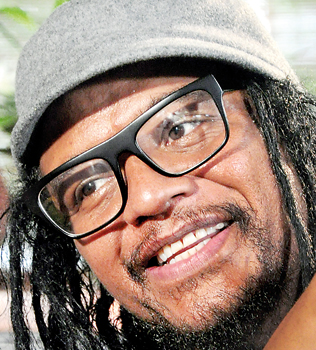Sunday Times 2
The very colourful truth about the king of crooners
With his perma-tanned face and tinted spectacles, Andy Williams looked nothing like a multiple Grammy winner, a survivor of Sixties party madness or a political insider. The dangerous charisma of Frank Sinatra or Sammy Davis Jr was absent. He looked more like a celebrity golfer in a cosy pullover – a role he loved to play.
But his hits are instantly memorable, from Moon River and Music To Watch Girls By, to Born Free and Can’t Take My Eyes Off You. Yesterday, Williams died aged 84, after a year-long battle with bladder cancer.
It was a life that began with a strict, Presbyterian upbringing in Midwest obscurity – but spiralled up to national fame, notoriety and scandal with his involvement in one of the most talked-about celebrity murder trials ever staged.
Williams was born in 1927 in Wall Lake, Iowa. ‘One of those one-stoplight, one-horse, Midwestern towns, a place that epitomised smalltown America. A great place to grow up,’ he said.
One of his earliest memories was of hiding in the cellar with his mother as a tornado tore through the fields, damaging the roof of their house.

Singer Andy Williams performs "Moon River" during a gala salute in Beverly Hills in this July 22, 2001 (REUTERS)
Williams always claimed that his favourite game as a child was to be hidden in a mail sack by his father, Jay, who was a postman on the freight rail line. Jay would hoist him out of the carriage window and hang him on the mail hook as they rattled through Wall Lake station, where his mother would be waiting to haul the sack down. The boy would leap out shouting: ‘Surprise!’
In print, the story sounds like sheer hokum. But Andy Williams had a knack for making the most unlikely tales sound like ‘downhome’ truths – a knack that would serve him well.
Yet his carefully cultivated, squeaky-clean image hid an extraordinary, often scandalous story.His singing career began in Wall Lake’s Presbyterian church, where Andy and his older brothers, Richard, Robert and Donald, sang in the choir. Their father promoted them as close harmony singers to radio producers in Des Moines, Iowa’s capital.
Jay was a hard taskmaster. ‘You have to practise harder,’ he told his sons over and over, ‘because you’re not as good as the others out there.’
By the early Forties, the family had moved to Los Angeles, in the hope the boys could break into Hollywood.
They caught the ear of crooner Bing Crosby, then America’s biggest-selling singer, who picked them as the backing group for his 1944 hit Swinging On A Star, which went on to win an Oscar for Best Original Song.
It was an impressive way to launch a career, but Williams, by now 16, immediately went one better – his voice was chosen to dub the husky tones of 19-year-old Lauren Bacall in her debut film, To Have And Have Not.Director Howard Hawks insisted that the song, How Little We Know, was eventually performed by Bacall herself in the final cut. Williams would never confirm that he’d been ousted; he just gave his slow smile and said ‘Maybe’, giving everyone the impression he was the real star.
After the war, the brothers teamed up with comedienne Kay Thompson, and despite an 18-year age gap, the 22-year-old Williams and Kay began a long affair.
Kay, best remembered for her role opposite Audrey Hepburn as the acerbic fashion editor in Funny Face, promoted his career ceaselessly.But it wasn’t a quick path to stardom. After his brothers quit the business to raise families, Andy soldiered on, sometimes earning so little that he was reduced to eating dog food. ‘It tasted damned good,’ he claimed.
Regular spots on U.S. television’s Tonight Show, engineered for him by Thompson, finally gave him hits – first as a rock ‘n’ roller, shaking his hips like Elvis Presley, and then as a crooner. Though the laidback, easy-listening style was already out-of-date, it suited his voice and his personality. He was a born family entertainer.
But his private life was far raunchier than his mild-mannered singing would lead you to believe. He married a showgirl, was accused of an affair with a Kennedy and found himself embroiled in a murder trial which caused a media frenzy.
In 1960, Williams was driving through Las Vegas when he spotted a young woman beside a broken-down car at the side of the road. He stopped to help, and was immediately smitten by the 18-year-old, French-born showgirl, Claudine Longet. With her wide mouth and dark, curling hair, she was breathtakingly beautiful – admirers used words like ‘ethereal’ and ‘exquisite’.
They married a year later, and throughout the Sixties the couple were at the heart of the showbiz party circuit – with singer Barbra Streisand, Senator Bobby Kennedy and astronaut John Glenn among their close friends.
Williams’s career had gone stratospheric. He had one big advantage over the older generation of crooners like Sinatra and Perry Como – they were baritones, but he possessed a lighter, tenor voice, making it closer to the prevailing pop sound.
As Beatlemania swept America, Williams had his own prime-time TV show, top billing at Caesar’s Palace in Vegas and a string of Gold albums. His signature tune was Henry Mancini’s Moon River, made famous by another Hepburn film, Breakfast At Tiffany’s.
Other hits made him a superstar – Days Of Wine And Roses, Born Free, Charade, the theme from Love Story, and Speak Softly Love from The Godfather. All were movie songs: Williams knew the cinema was a better vehicle for his voice even than TV.
The savvy Williams believed his own star would shine the brighter if he surrounded himself with other luminaries, so instead of hogging the airtime on his own show, he brought on a cavalcade of guests. He discovered The Osmonds, first as a group of four brothers and later with a nine-year-old Donny.
Simon and Garfunkel, the Jacksons, Julie Andrews and Woody Allen all clamoured to appear with the man that Las Vegas now hailed as ‘the Emperor of Smooth’.
When Robert Kennedy, brother of the murdered president Jack, was campaigning for the nomination as Democrat candidate for the White House in 1968, Andy and Claudine were among his closest supporters.
At the Ambassador Hotel in LA, Williams was dressing in his room and watching Kennedy – who was in the lobby downstairs – on TV talking to reporters, when a man stepped out of the crowd and shot Kennedy three times. A stricken Williams, who had heard the shots on his television, rushed to the hospital where his friend lay on a bed, soaked in blood.
Friends brought fresh clothes to dress the body, but had forgotten a tie. Williams took off his own and offered it to Bobby’s widow, Ethel. ‘I was putting that on when I heard the shots,’ he said. At the funeral in New York, Williams sang The Battle Hymn Of The Republic, and as his voice was broadcast outside St Patrick’s Cathedral, thousands of mourners lining the streets joined in.
Williams’s own politics remained an enigma. Despite his friendship with the Kennedys, he gave the impression of being an arch-conservative and Republican. In later years, he accused Barack Obama of being a Marxist. But when John Lennon was being hounded by the FBI, Williams campaigned staunchly to allow the ex-Beatle to stay in America.
He and Claudine had three children; the youngest, born in 1969, was named Bobby, in homage to his murdered friend.
But the marriage hit the rocks, partly because of persistent rumours linking Williams with Bobby’s widow, Ethel.
He always insisted, in his measured drawl, that he and Ethel were simply friends, just as they had been when her husband was alive.
Claudine, meanwhile, was deeply involved with a champion skier, Spider Sabich, an Olympic medallist and infamous party animal.Her singing career, which had produced a dozen minor chart hits, floundered, and she divorced Williams in 1975. Wild living had tarnished both her looks and voice.
Then, in the bathroom of a ski chalet in Aspen, Colorado, Claudine shot Spider in the stomach with a .22 pistol. He died in the ambulance on the way to hospital.The subsequent murder trial was a cause celebre. Aspen was one of America’s celebrity hotspots: Jack Nicholson and John Denver owned neighbouring chalets.
Rumours swirled that a blood sample taken from Claudine showed signs of cocaine use but, because of procedural errors by police, the evidence was inadmissible in court.Andy Williams appeared in court to testify on behalf of his ex-wife, and many believed that his testimony, in the face of damning circumstantial evidence, saved her from a long prison sentence.
In the event, her plea that the gun had gone off accidentally was accepted and she was found guilty only of criminal negligence. She served just 30 days in jail.
‘I had to be there for her,’ Williams said. ‘She is the mother of my children. I accept her story, I think she is telling the truth.’
Others took a more cynical view. The Rolling Stones recorded a scabrous song, simply called Claudine, for their album Emotional Rescue in 1980: ‘Only Spider knows for sure,’ sang Mick Jagger, ‘but he ain’t talking about it any more.’ Under legal pressure, the band dropped the song before the album’s release.
In 1991, Williams married again, this time to a woman 30 years his junior, Debbie Meyer. He built a 2,000-seater concert hall in the Midwest, at Branson, Missouri, where he gave a string of sold-out performances every year, with tickets selling at $50 each.
He had never forgotten the financial hard times of dog-food dinners and retirement was impossible. His music reached a new generation when it was seized on by advertising executives for TV commercials. Fiat got there first, with an ad featuring the Brazilian-flavoured Music To Watch Girls By.
Honda followed with The Impossible Dream, and Marks & Spencer grabbed his Christmas song, It’s The Most Wonderful Time Of The Year, for a seasonal ad.Earlier this year, Williams sent a message to his fans via Twitter: ‘You know those girls that used to go by? I miss watching them.’
The world will certainly miss him, too.
THE MAGIC OF MOON RIVER
Despite a long catalogue of hits, the song for which Andy Williams will forever be remembered is the timeless Moon River.
Written by Henry Mancini and Johnny Mercer in 1961, it was originally composed for the movie Breakfast At Tiffany’s to be sung by Audrey Hepburn’s character Holly Golightly.
In the same year, Moon River won the Academy Award for Best Original Song. It was performed at the Oscars in 1962 by Williams who quickly became identified with the track. Although he never released it as a single, Williams’ album Moon River And Other Great Movie Themes was certified gold in 1963 after grossing $1million in sales.
In 1992, he opened a theatre in Branson, Missouri, named after his famous song. Andy Williams’ biography, Moon River And Me, was published in October 2009.
© Daily Mail, London
Follow @timesonlinelk
comments powered by Disqus
















